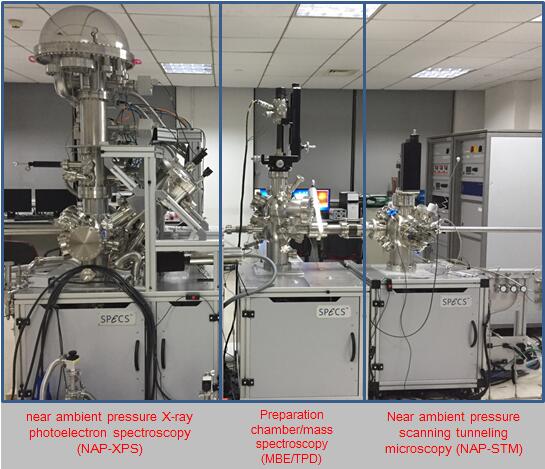Near ambient pressure X-ray photoelectron spectroscopy (NAP-XPS) and near ambient pressure scanning tunneling microscopy (NAP-STM) combined system is a customized equipment from SPECS Surface Nano Analysis GmbH. Recently, the installation and configuration have been accomplished in Vacuum Interconnected Nanotech Workstation (Nano-X), Suzhou Institute of Nano-Tech and Nano-Bionics (SINANO), Chinese Academy of Sciences (CAS).

Installation and debugging of NAP-STM and NAP-XPS system was completed.(Image by SINANO)
The NAP-STM and NAP-XPS combined system is mainly for the research interest of “Nano energy and catalysis material”, the one of the to-be verified projects in Nano-X. This project focuses on the chemical reaction among multi-components at atomic level, especially on the transition process, to fully understand the catalytic mechanism and finally achieve the efficient, green and novel reaction route’s design. Taking the advantage of Nano-X, the function of NAP-STM and NAP-XPS system will be fully strengthened, and promote the comprehensive understanding on the basic physics, catalysis, materials, devices as well as interdisciplinary subjects.
The NAP technology means that the sample is characterized in a well-controlled atmosphere environment, instead of simply exposing the sample to the air. From ultra-high vacuum to atmospheric pressure, NAP-STM/XPS can bridge the "pressure gap", satisfies many scientific demands in nano energy and catalysis material’s study. As state of the art equipment in surface analysis, the SPECS NAP-STM can work in the pressure up to 100 mbar, in the temperature up to 500℃. Equipped with differential pumping system and monochromatic x-ray, NAP-XPS is applicable for the research of solid surface and even liquid surface in up to 25 mbar atmosphere, with the ability of following the in-situ changes of chemical state, components, as well as electronic structure of the catalysis material and working battery. In this combined system, NAP-XPS and NAP-STM are vacuum connected through the molecular beam epitaxy (MBE) chamber in the middle, which could also be vacuum connected to the other machines in the NANO-X.
Contact Information:
Prof.CUI Yi,Vacuum Interconnected Nanotech Workstation,Suzhou Institute of Nano-Tech and Nano-Bionics,Chinese Academy of Sciences.
Email: ycui2015@sinano.ac.cn

